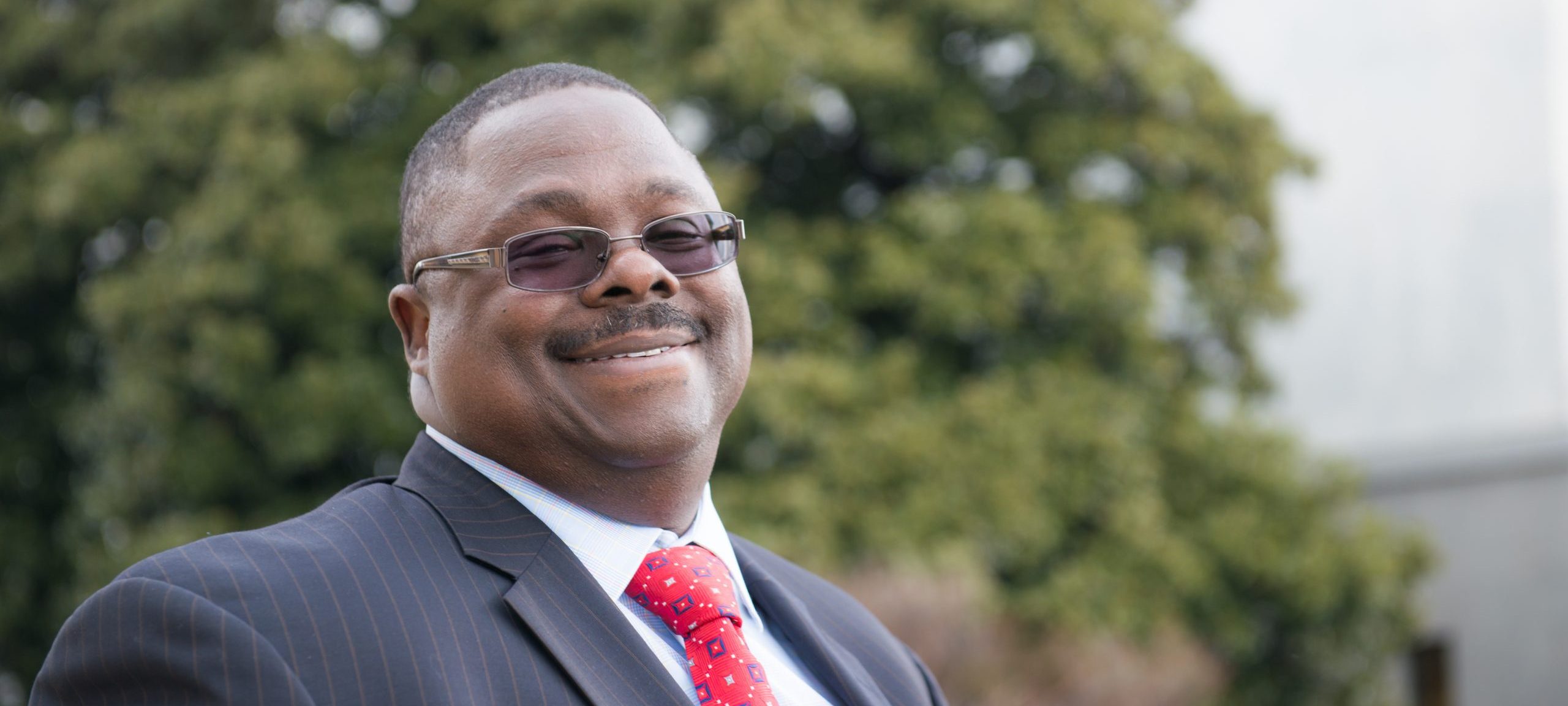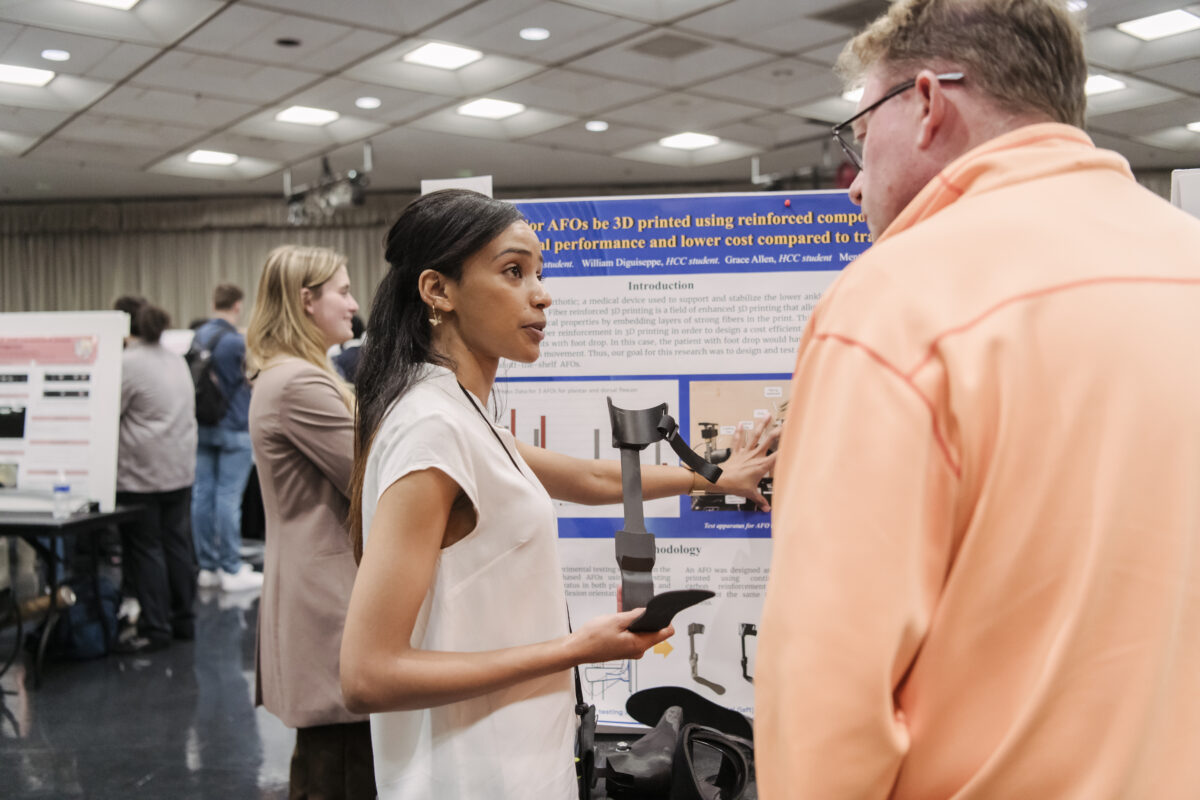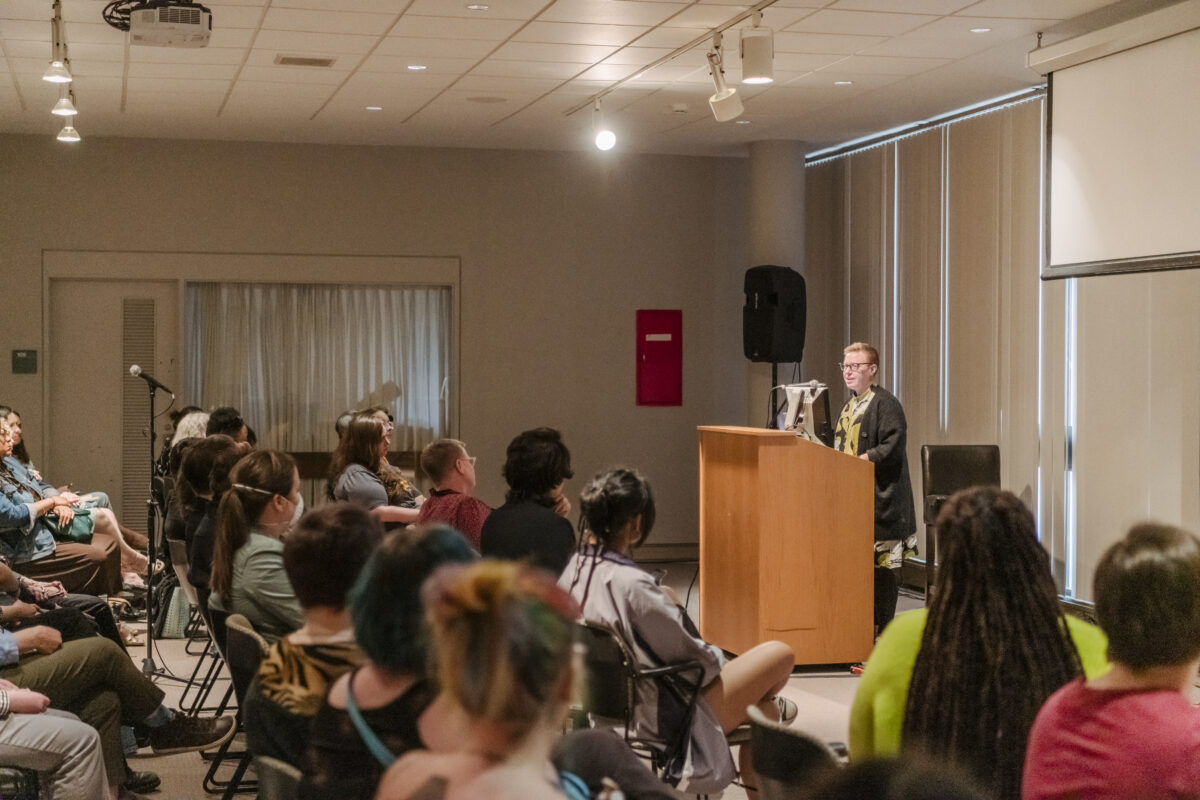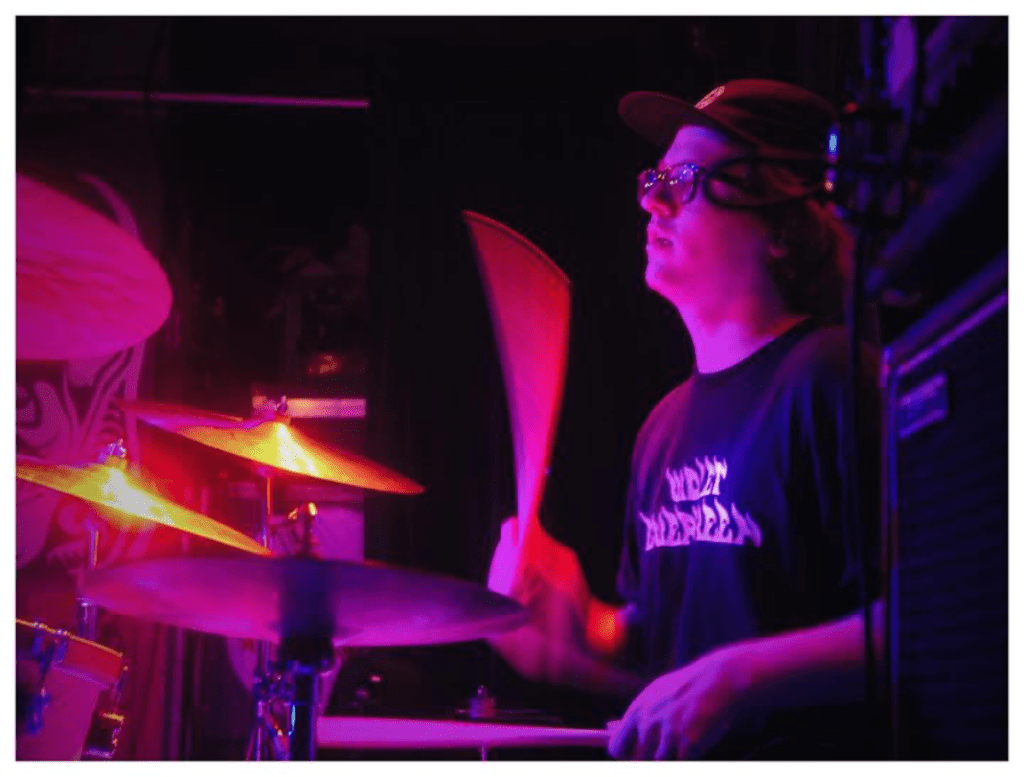Tyson King-Meadows, professor of political science and associate provost for strategic initiatives in the Office of the Provost, has played a vital role in UMBC’s culture and academic policy work since 2003, when he joined the campus as an assistant professor of political science. He credits these experiences for preparing him to serve next as dean of the College of Liberal Arts at the University of Massachusetts Boston (UMass Boston) this fall.
“At UMBC, I have learned that a university can only move forward when it moves beyond talking about a problem and shifts into creating and implementing solutions,” shares King-Meadows. “I developed a keen eye for big solutions to big problems.”
King-Meadows is an accomplished scholar, notes President Freeman Hrabowski, as well as an inspiring teacher with a strong voice for the arts, humanities, and social sciences. “What makes him particularly effective in his work is his dedication to serving as a champion for both students and colleagues,” shares Hrabowski. “All of us at UMBC are very proud of him as he begins this new role at UMass Boston.”
Kimberly Moffitt, interim dean of the College of Arts, Humanities and Social Sciences (CAHSS), has worked with King-Meadows for 15 years. She says his example to all is to keep envisioning possibilities in the face of adversity. “I am simply ecstatic that UMass Boston recognizes him as a talented, visionary leader who will enhance their campus as he has ours,” she shares.
National recognition
King-Meadows has achieved local, regional, state, national, and international recognition for his work. In 2019-2020, he was awarded the American Council on Education (ACE) Fellowship, serving in the Provost’s Office at Case Western Reserve University. He assisted Provost Ben Vinson III on efforts related to strategic planning, community engagement, and faculty development.
“Tyson has drawn upon his ACE experience to significantly impact our work at UMBC,” shares Philip Rous, provost and senior vice president for academic affairs. “In addition to working with deans and shared governance to align general education with the priorities of UMBC’s strategic plan, Tyson has strengthened our partnerships with academic learned societies in ways that significantly expanded our efforts to recruit and retain diverse faculty, staff, and students.”
King-Meadows served as an American Political Science Association Congressional Fellow in 2012-13, working for the U.S. House Committee on the Judiciary. Earlier in his career, he was also a recipient of the National Academy of Sciences’ Ford Foundation Postdoctoral Fellowship and was a fellow of the W.E.B. Du Bois Institute for African American Research at Harvard University. And in 2003-04 he was a Fulbright U.S. Scholar in the Department of Political Science at the University of Ghana, where he taught American politics and researched aspects of African politics and democratization.
Diversity and inclusion leadership
In his current UMBC role as special assistant to the provost for faculty development and engagement, King-Meadows has researched and developed best practices for faculty development programs. He has also laid the groundwork with campus and external partners to develop new programs aimed at recruiting prospective underrepresented minority faculty and students.
As a co-chair of the Provost’s Executive Committee for the Recruitment, Retention, and Advancement of Underrepresented Minority Faculty, King-Meadows has played a vital role in the design and implementation of the Postdoctoral Fellowship for Faculty Diversity and the Emerging Scholars Program. Launched in 2011, the postdoctoral program has brought in 18 fellows across a broad range of disciplines. Seventeen have already transitioned to higher academic positions, including 11 at UMBC.
“Talented minority faculty are not unicorns,” King-Meadows said to Amy Scott, senior correspondent for Marketplace, in a segment on confronting bias in faculty hiring. “It just depends on where you’re looking,” he told Scott. He went on to explain the importance of senior faculty of all backgrounds demonstrating commitment to faculty diversity, saying, “We understand here at UMBC that the burden of inclusiveness should not rest on minority faculty.”
Political science research
King-Meadows’s contributions to the field of political science are many. His research has broadened understanding of the complex issues that influence the political involvement and representation of Black communities.
King-Meadows explores this topic through the lens of the economic disparities and sociopolitical stratification present in the United States during the late twentieth century and early twenty-first century. His first single-authored book was When the Letter Betrays the Spirit: Voting Rights Enforcement and African American Participation from Lyndon Johnson to Barack Obama (Rowman & Littlefield, 2011). It examines the design and implementation of the 1965 Voting Rights Act and the impact of its four renewals on Black voter registration and election turnout.
“Tyson is a tremendous scholar who exhibits a rare command of both the institutional side of the American politics subfield as well as the behavioral side of American politics,” says Thomas Schaller, professor of political science. He and King-Meadows co-authored Devolution and Black State Legislators: Challenges and Choices in the Twenty-first Century (State University of New York Press, 2006). Schaller says, “I’m proud to have co-authored a book with him about the growing power of Black state legislators in the United States.”
Launching student careers
Over the last 17 years, King-Meadows has enriched students’ research experiences and helped them explore various career pathways. He shares that he is grateful for the opportunity to work with students at the beginning of their academic journeys and then see them take that knowledge through to successful careers.
Arthur Johnson, professor of political science and provost emeritus, hired King-Meadows and recalls the young faculty member’s rigorous classes and the valuable research experiences he provided his students. He remembers, “It was common for Tyson to be in his office with students well into evening hours advising them, helping them understand the material presented in class, and planning research.”
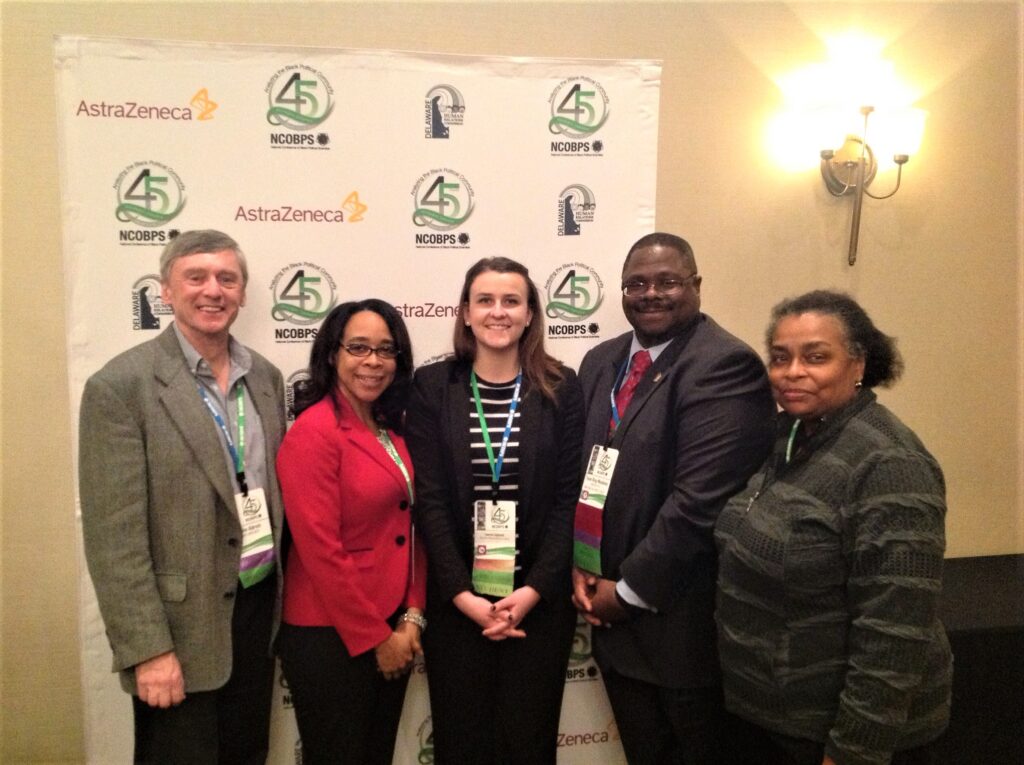
King-Meadows also values opportunities to collaborate with alumni as they move on in their careers. He is currently working on two articles with a former senior research assistant, Rhoanne Esteban ‘11, political science. Esteban is a doctoral student at UC Santa Barbara and a data analytics engineer at Travelers Insurance.
He is also co-authoring a book chapter on Baltimore with McNair Scholar mentee Marcus Board ‘07, political science. After graduating from UMBC, Board earned a Ph.D. from the University of Chicago and is now an assistant professor of African American studies at Georgetown University.
“I’ve never considered it a mentor/mentee relationship as much as a unique pairing with great strengths,” says Board. “Between the two of us, we hold great imagination, kindness, focus, and a commitment to racial justice. I’m thankful for Dr. King-Meadows’s support over the years.”
Teaching social justice
Social upheavals in Baltimore and across the nation have put King-Meadows in the spotlight as a scholar of Black political representation and as a former president of the National Conference of Black Political Scientists. Media and institutions have frequently called upon him to share policy background and reflections related to urgent demands for police reform and anti-racism work.
After Baltimore’s 2015 Uprising in response to the death of Freddie Gray, King-Meadows participated in a campus teach-in offered by UMBC faculty. At the teach-in, he discussed his research paper, “Harbingers of unrest in Baltimore.” The Washington Post included the paper in “Here’s how to teach Black Lives Matter,” a curated syllabus of research articles on the Black Lives Matter movement.
In June 2020, in the midst of global protest asking for justice for the murder of George Floyd and the increased support for the Black Lives Matter movement, King-Meadows once again joined UMBC faculty and leadership in a town hall, “The Many Faces of Structural Racism: A Campus Conversation.” He explained the history of disenfranchisement in the Black community.
“Whether centered on social justice issues related to the Baltimore Uprising or the racial reckoning after George Floyd’s death,” shares Moffitt, “Dr. King-Meadows has consistently encouraged us to do more and do better while continuing to center issues of inclusive excellence and equity.”
King-Meadows also worked with UMBC’s Shriver Center to develop an afterschool civic engagement program for elementary school students. “Our Civic Voices” taught students at Baltimore City’s Federal Hill Preparatory School how to write letters to their representatives on the City Council and in Congress to express their concerns about problems in their community. King-Meadows notes, “The students now know they can be an active part in the democratic process without actually casting a vote—that was powerful.”
Lessons from UMBC
One of King-Meadows’s most salient memories while at UMBC was Baltimore’s 2011 earthquake, which happened while campus leaders were busy working at their annual retreat. Everyone left the building—but not for long.
After the building was deemed safe, everyone stayed to continue with their work of planning for the year ahead. His takeaway was that as long as people are safe, “we are going to continue to be in the trenches, to fulfill our social justice purpose, our economic mobility purpose, in service of the faculty, staff, and students,” says King-Meadows. “I will carry this lesson with me as I head to the University of Massachusetts Boston.”
Banner image: Tyson King Meadows. Photo by Marlayna Demond ’11 for UMBC.
Tags: CAHSS, cahssresearch, diversityandinclusion, PoliticalScience

